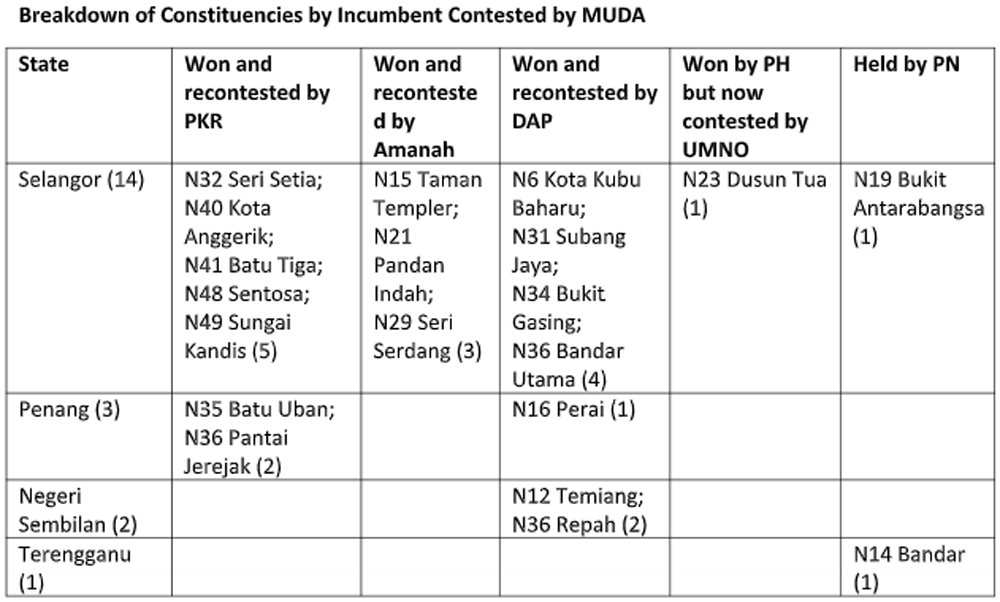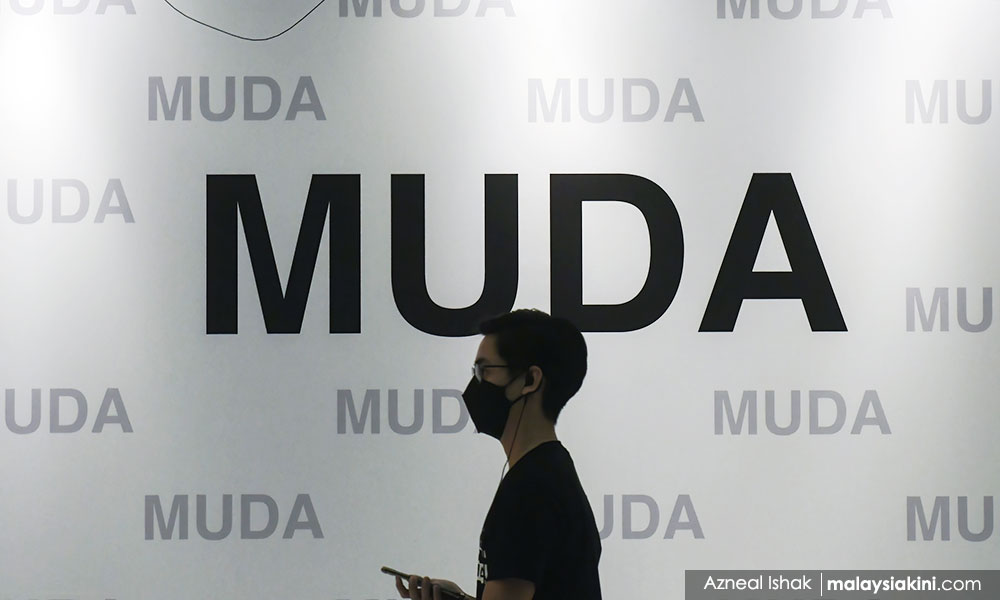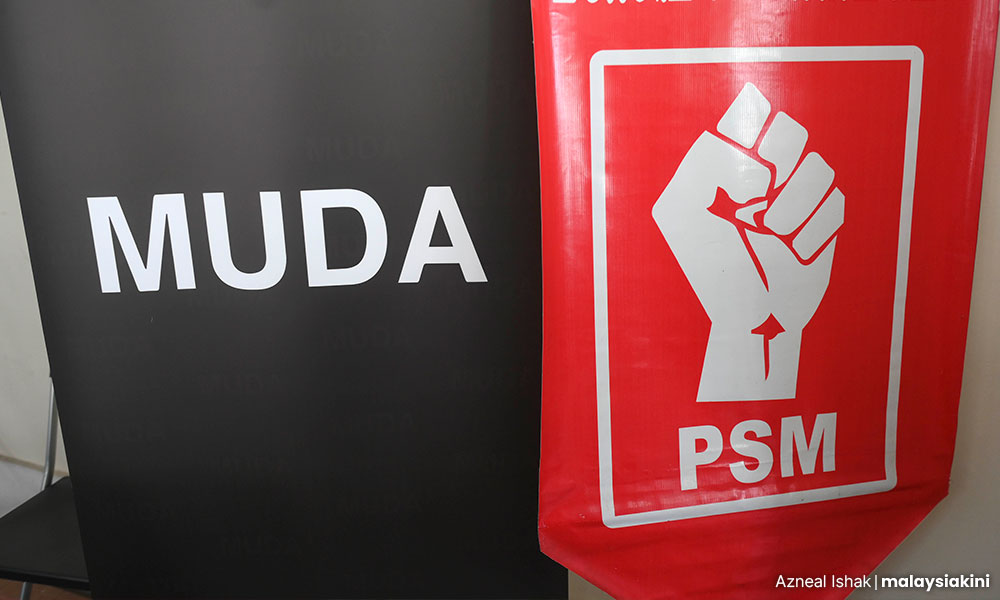Two political scientists, Mazlan Ali of Universiti Teknologi Malaysia (UTM) and James Chin of the University of Tasmania, have predicted that Muda is heading towards irrelevance.
In an interview with Free Malaysia Today, Mazlan opined that all Muda candidates are expected to lose their deposits while Chin foresaw Muda being blamed for Pakatan Harapan's defeat in marginal seats.
Total defeat likely but still reversible
I am one of the few analysts who argue that Muda’s participation in the state polls may produce a win-win outcome for the party and Harapan.
That possibility is based on a few strategies: (a) contesting in not more than 5 percent of constituencies in each state; (b) contesting against Perikatan Nasional and Umno, not just Harapan; (c) exciting apolitical voters; (d) attracting fence-sitting Malay youth from PN; and (e) positioning itself as the loyal opposition to Harapan, not ‘third force’.
Two weeks after the announcement of its first batch of candidates, and two days before nomination, the total defeat scenario Mazlan predicted is very likely, though still reversible.
In the past two weeks, Malaysians’ attention was on the arrest of caretaker Kedah menteri besar Muhammad Sanusi Md Nor, the personal battle between Sanusi and Home Minister Saifuddin Nasution Ismail, and the 1975’s fiasco at the Good Vibes Festival.
Muda’s historical nomination of 50 percent woman candidates and the party joining forces with PSM hardly made the news. These are all signs of their marginalisation.
Over-contestation
Muda will contest in 20 constituencies, 14 of which are in Selangor (25 percent), and none in Kelantan and Kedah.
Muda candidates will take on Harapan as the incumbent party in 17 seats: PKR (7), DAP (7) and Amanah (3). Muda will contest in only two PN-held seats, including the Chinese-majority Bukit Antarabangsa won by former minister Azmin Ali under PKR’s ticket, and one seat given by Harapan to Umno. (See Table)

This means Muda has positioned itself clearly as mainly a challenger to Harapan – instead of also PN and Umno – in multiethnic constituencies.
While this would be easier for Muda’s first-time candidates, it also makes Muda a spoiler to Harapan supporters, whose votes Muda needs to have any chance of winning.
In other words, fielding too many candidates in Harapan territories and too few in PN (including Luqman Long in Bandar, Terengganu) and BN areas is disadvantaging every candidate.
Looking at these constituencies, Muda may have the chance to win or at least emerge second in one constituency, Perai in Penang.
The dropping of the outspoken caretaker deputy chief minister II P Ramasamy has alienated many Indians, as the dropping of Klang incumbent parliamentarian Charles Santiago in the 15th general election (GE15) did.
If DAP fails to resolve the Indians’ anger and Muda’s Viky Harikrishnan can win Chinese votes, Muda may have a breakthrough.
Elsewhere, Muda candidates may indeed lose their deposits if their failure to draw media attention continues.

Realistic three-level goal-setting
To not be written off after this state election, Muda must be realistic in setting its goals. Winning is the highest goal but even in the best case, that is possible in only a handful of constituencies.
The medium goal is emerging second – overtaking PN in Harapan strongholds or overtaking Harapan/Umno in PN strongholds. If Muda can win the second most votes, it is by definition not a spoiler, a label which can kill Muda in GE16. Winning 12.5 percent of votes and keeping deposits is the minimum goal.
Here is the tricky part. To win, Muda must be able to win most of Harapan votes. However, the majority of Harapan supporters are strategic voters. They would not swing towards Muda until Muda overtakes Harapan/Umno as PN’s main rival in the constituency.
If Muda competes with Harapan in a ‘red-ocean’ game, except in exceptional cases like Perai, Muda candidates will be labelled as a spoiler and then shunned.
Muda’s best strategy is to first aim for keeping deposit and emerging second, and counter-intuitively, getting their first pot of votes outside of the Harapan base. This is like winning the heart of one’s love interest by first becoming popular in the eyes of others.
Five strategies to consider
In the next two weeks, Muda may want to concentrate and use strategically its resources – volunteers, finance, network, media coverage – to yield optimum outcomes. It may consider these five strategies.
First, target non-voters. As separately held state elections tend to register a lower turnout by 10-20 percent points lower than federal elections, Parti Aku Malas Undi (Pamu) which translates to the I’m Lazy to Vote Party may be as large as 36-46 percent.
Muda and its ally PSM talk about “new politics”, a two-decades-old slogan since Reformasi, they must now launch an aggressive campaign with issues ignored by Harapan-BN and PN to excite and convert Pamu to Muda-PSM.

Second, target fence-sitting Malay youth. The so-called “Green Wave” consists of not just PAS’ conservative base and ex-Umno partisans (from Bersatu to anti-Umno president Ahmad Zahid Hamidi dissidents), but also many unprivileged Malay youth, who find Harapan and Umno incapable to understand their plight and articulate their concerns.
Many of them see even Sanusi as a popular hero who dares to challenge high institutions. This is the ‘blue ocean’ for non-PN parties. Can Muda’s middle-class candidates and activists find a new language to be their spokespersons, without attacking the unity government too much and alienating the Harapan base?
Third, target women voters. Many women complain about under-representation in politics, business and society. Second, after PSM nominated one candidate for each gender in GE15, Muda boldly launched a 50 percent female candidate slate. This unfortunately did not get adequately noticed in the media and even civil society.
Muda and PSM should highlight their commitment to gender inclusion to appeal to women and progressive voters. When you are ahead, don’t be shy in self-promotion.
Fourth, pool candidates to pull a crowd. In Singapore, opposition parties like the Workers’ Party have only one rally nationwide every night. They pool their candidates together to increase star power. Their supporters follow these rallies every night to produce a large crowd to impress the fence-sitters.
Muda-PSM should emulate this, especially in Selangor, to have only one joint rally a night to attract an audience and media. All candidates should also gather one night each in Penang, Negeri Sembilan and Terengganu. If some candidates shine in these roadshows, they will get more media attention and a higher chance to win. And more resources should move to the hopeful.

Fifth, pledge ‘confidence-and-supply’ (CSA) support to Harapan. While ‘third force’ may be a sexy phrase for activists, it often just means ‘spoiler’ or ‘opportunist’ to ordinary voters.
If Muda-PSM wants to win the Harapan base, they should declare on nomination day their CSA support for Harapan and their role as ‘loyal opposition’ in any circumstance. Don’t leave any doubt for Harapan voters that they may back PN.
No spoiler
If Muda-PSM works hard to win votes beyond Harapan’s hardcore, they can’t be labelled as a spoiler. If they succeed, they can pull over the Harapan base. If they fail, the Harapan base stays put. Malaysian politics has changed, and everyone should update their game.
All the best, Muda-PSM! - Mkini
WONG CHIN HUAT is an Essex-trained political scientist at Sunway University. He is a professor at the university’s Sustainable Development Solutions Network (SDSN) Asia. Mindful of humans’ self-interest motivation while pursuing a better world, he is a principled opportunist.
The views expressed here are those of the author/contributor and do not necessarily represent the views of MMKtT.

No comments:
Post a Comment
Note: Only a member of this blog may post a comment.